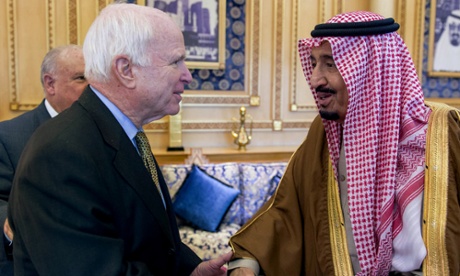- Group met with Saudi and Qatari leaders who support Syria’s opposition
- Civilians continue to flee rebel-held areas

A message on the official Twitter feed for McCain, Republican of Arizona, said the US delegation met the commander of Saudi Arabia’s training and equipment programme and with Ahmed al-Jarba, whom it identified as the president of the Western-backed Syrian National Coalition (SNC). Al-Jarba stepped down as SNC president in July 2014. The current SNC president is Khaled Khoja. The reason for the discrepancy in McCain’s tweet was not immediately clear.
The senators also met in neighbouring Qatar with Sheikh Tamim bin Hamad Al Thani, the country’s emir. The delegation included Senators Lindsey Graham, Republican of South Carolina; Joe Donnelly, Democrat, Indiana; Angus King, an Independent from Maine; and Tim Kaine, a Democrat from Virginia, the state news agency reported. All sit on the Senate’s armed services committee, which McCain chairs.
Saudi Arabia and Qatar are staunch supporters of Syria’s opposition, which is mired in a nearly four-year civil war to oust President Bashar Assad.
The meetings took place on Saturday, a day after the Pentagon said that as many as 1,000 US troops and support personnel would be sent to Turkey, Saudi Arabia and Qatar to help train vetted Syrian rebels. Rear Admiral John Kirby, a Pentagon spokesman, said the training by a mix of US special and conventional forces could begin as early as this spring.
In Syria, hundreds of civilians fled from rebel-held towns east of Damascus that had been blockaded for at least 18 months. Hundreds of women and children could be seen in footage aired by the Lebanese channel al-Mayadeen sitting in what appeared to be a large courtyard.
One of the women said rebel fighters seized men fleeing with them. “As soon as you leave, they’ll start hitting us,” she said they told the group, referring to Syrian government forces.
The woman, who did not give her name, said they had been eating stale cracked wheat and barley to survive. Activists in those areas had said they were mostly living without power for months, including during a snowy winter, and had only sparse food supplies. Both Syrian forces and rebels use blockades to pressure their foes to surrender, often causing widespread suffering of civilians.
State-run media said some 2,000 civilians fled, including over 1,000 children and 350 gunmen who surrendered. The Britain-based Syrian Observatory for Human Rights, which relies on a network of activists inside Syria, estimated the number at 1,200. It was not immediately clear why Syrian authorities allowed the civilians to flee. The area has long been held by armed groups fighting Assad’s rule.
In recent months more moderate rebel groups have increasingly clashed with jihadi organizations, including the Islamic State (Isis) group and Al-Qaida’s Syrian affiliate, the Nusra Front.
Elsewhere in Syria, a military cargo aircraft laden with ammunition and food was downed late on Saturday in the country’s north. It was not immediately clear whether the Syrian cargo plane was shot down or crashed. The Nusra Front said on its Twitter feed on Sunday that its fighters shot down the aircraft overnight near the Duhour air base. The incident was also reported by the Observatory.
Syria’s state-run media said the plane crashed while trying to land in poor weather on Friday evening, killing the entire crew. Syrian rebels have shot down government aircraft in the past using anti-aircraft weapons.
Western officials who back rebel efforts to overthrow Assad have been reluctant to provide more anti-aircraft weapons, fearing they would fall into the hands of groups like the Nusra Front. But more moderate groups have said they need the weapons because Assad has relied on military aircraft to bomb civilian areas, killing thousands and forcing tens of thousands more to flee opposition-held areas













No comments:
Post a Comment